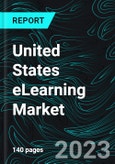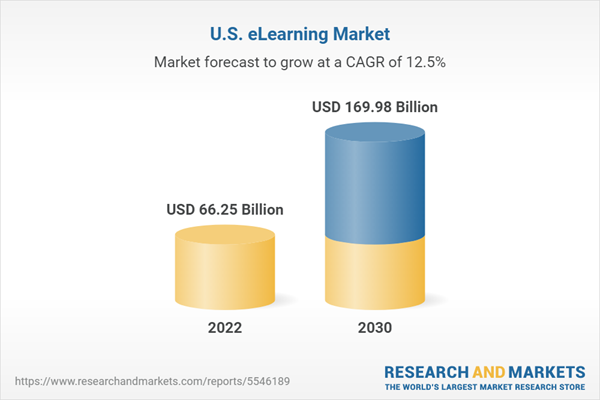Online or e-learning has become essential for many organizations as it improves employee performance. The integration of the Internet of Things (IoT) is playing a pivotal role in establishing smarter and more connected educational environments. Institutions are embracing technology advancements and adopting new tools and techniques to enhance the E-learning experience. This transformation is creating a more dynamic and engaging educational ecosystem, empowering students with innovative opportunities for growth and development.
United States E-learning market in the United States is projected to grow double-digit compound annual growth rate (CAGR) of 12.50% from 2023 to 2030
The increasing accessibility of the internet and smartphones has fueled the demand for seamless connectivity among electronic devices in the U.S. This trend is driven by the continuous evolution of cloud infrastructure and the affordability of data, resulting in enhanced connectivity that addresses issues related to cost, scalability, security, and efficiency. As the number of connected devices grows, the platforms supporting connectivity continue to advance, offering a wide range of business opportunities. These opportunities include streaming webinars that expand the reach of high-quality educational content from renowned universities and facilitating vital medical advice to remote areas throughout the United States of America.
For example, IBM statistics reveal that eLearning can boost productivity by 50% through the use of online learning software, allowing employees to conveniently engage in training courses at their preferred time. This demonstrates how e-learning has revolutionized education and professional development by providing flexible and accessible learning opportunities. The United States eLearning Market Size was US$ 66.25 Billion in 2022.
Academic segment is experiencing substantial growth and is expected to continue expanding in the coming years
By End User, United States eLearning Market is segmented into Corporate, Academic and Government. The academic sector holds the largest market share in the United States e-learning industry, driven by the growing demand for online education across all levels, from K-12 to higher education. E-learning platforms provide a wide range of academic courses, study materials, and interactive learning tools, catering to diverse subjects and disciplines.
The convenience and flexibility offered by online learning have attracted students seeking alternative educational options, including remote or self-paced learning. The COVID-19 pandemic has accelerated the adoption of e-learning in academic settings, leading to increased investments in digital infrastructure and the development of comprehensive online learning ecosystems to support student engagement and academic success.
Large enterprise segment is experiencing significant expansion, driving the overall growth of the United States e-learning industry
By Corporate End User, United States eLearning Market is sub- segmented into SMBs and Large Enterprises. Large enterprises are witnessing rapid growth in the United States e-learning industry, as they recognize the numerous benefits of online learning for their workforce. With a focus on up skilling and professional development, large companies are embracing e-learning platforms to deliver training programs and educational resources to their employees. This shift towards digital learning allows for cost-effective and scalable training solutions, ensuring that employees have access to the latest knowledge and skills required for their roles. The flexibility and convenience of e-learning cater to the diverse needs of large enterprises with geographically dispersed teams.Higher education segment's dominance in the e-learning industry underscores its significance in shaping the future of education and meeting the evolving needs of modern learners
By Academic End use, United States eLearning Market is divided into Online K12 Education, Vocational training and Higher Education. Higher education holds the largest share of market revenue in the United States e-learning industry, driven by the increasing adoption of online learning platforms by universities and colleges. With the rising demand for flexible and accessible education, institutions are leveraging e-learning solutions to offer a wide range of courses and degree programs to students across the country. Online degree programs, virtual classrooms, and interactive learning materials have become integral components of higher education, attracting learners who seek convenience and personalized learning experiences.Growing acceptance and trust in online e-learning platforms as a reliable and effective educational medium
By Technology, United States eLearning Market is breakup into Online e-learning, LMS, Mobile e-learning, Rapid e-learning, Virtual classroom and Others. Online e-learning commands the highest market share in the United States e-learning industry, showcasing the growing preference for digital learning platforms. With advancements in technology and widespread internet accessibility, online e-learning has gained significant traction among learners of all ages and backgrounds. It offers a diverse range of courses, certifications, and degree programs that can be accessed remotely, providing learners with flexibility and convenience. Online e-learning platforms provide interactive and engaging learning experiences through multimedia content, discussion forums, and virtual classrooms. The ability to learn at one's own pace, access resources anytime, and connect with a global community of learners contribute to the dominant market share of online e-learning in the United States.Content market shapes e-learning, enhancing learning experiences for all students
By Provider, United States eLearning Market is sub-segmented into Service and Content. The content market holds a prominent position and garners maximum market share in the United States e-learning industry. High-quality and engaging content is the backbone of any successful e-learning platform. It encompasses a wide range of educational materials, including interactive modules, video lectures, quizzes, assessments, and supplementary resources. The demand for diverse and comprehensive content is driven by learners' quest for knowledge and skill development. Content providers play a crucial role in curating and delivering relevant, up-to-date, and engaging educational materials that cater to the needs of learners across various subjects and disciplines.Key Players
In the United States e-learning market, various players contribute to its fragmentation, including Abode System Inc, Cornerstone INC, Crtix INC, Microsoft Corporation, McGraw-Hill Education, Pearsons, Stride INC, and Coursera INCThis report titled “United States E-Learning Market by End Use (Corporate E-Learning, Academic E-Learning and Government E-Learning), Corporate E-Learning Market, Type (Small & Medium Business (SMBs) and Large Enterprises), Academic E-Learning Market, Segment (Online K12 Education (Elementary School Students, Middle School Students, Middle School Students), Vocational Training and Higher Education), Technology (Online e-learning, LMS, Mobile e-learning, Rapid e-learning, Virtual classroom and Others), Provider (Service, Content), Company (Abode System Inc, Cornerstone INC, Crtix INC, Microsoft Corporation, McGraw-Hill Education, Pearsons, Stride INC, and Coursera INC)” provides an all-encompassing analysis on the United States E-Learning Market.
Segments - This report has been covered from 3 viewpoints
1. Corporate E-Learning2. Academic E-Learning
3. Government E-Learning
Corporate E-Learning Type - Sub - Segment has been covered from 2 viewpoints
1. Small & Medium Business (SMBs)2. Large Enterprises
Academic Segments - Sub-segments has been covered from 3 viewpoints
1. Online K12 Education2. Vocational training
3. Higher Education
Online K12 Education further Divided into 3 Viewpoint
1. Elementary School Students2. Middle School Students
3. High School Students
Technology - This report has been covered from 6 viewpoints
1. Online e-learning2. LMS
3. Mobile e-learning
4. Rapid e-learning
5. Virtual classroom
6. Others
Provider - This report has been covered from 2 viewpoints
1. Service2. Content
All the companies have been studied from 3 points
- Business Overview
- Recent Development
- Sales Analysis
Company Analysis
1. Abode System Inc2. Cornerstone INC
3. Crtix INC
4. Microsoft Corporation
5. McGraw-Hill Education
6. Pearsons
7. Stride INC
8. Coursera INC
Table of Contents
Companies Mentioned
- Abode System Inc
- Cornerstone INC
- Crtix INC
- Microsoft Corporation
- McGraw-Hill Education
- Pearsons
- Stride INC
- Coursera INC
Methodology
In this report, for analyzing the future trends for the studied market during the forecast period, the publisher has incorporated rigorous statistical and econometric methods, further scrutinized by secondary, primary sources and by in-house experts, supported through their extensive data intelligence repository. The market is studied holistically from both demand and supply-side perspectives. This is carried out to analyze both end-user and producer behavior patterns, in the review period, which affects price, demand and consumption trends. As the study demands to analyze the long-term nature of the market, the identification of factors influencing the market is based on the fundamentality of the study market.
Through secondary and primary researches, which largely include interviews with industry participants, reliable statistics, and regional intelligence, are identified and are transformed to quantitative data through data extraction, and further applied for inferential purposes. The publisher's in-house industry experts play an instrumental role in designing analytic tools and models, tailored to the requirements of a particular industry segment. These analytical tools and models sanitize the data & statistics and enhance the accuracy of their recommendations and advice.
Primary Research
The primary purpose of this phase is to extract qualitative information regarding the market from the key industry leaders. The primary research efforts include reaching out to participants through mail, tele-conversations, referrals, professional networks, and face-to-face interactions. The publisher also established professional corporate relations with various companies that allow us greater flexibility for reaching out to industry participants and commentators for interviews and discussions, fulfilling the following functions:
- Validates and improves the data quality and strengthens research proceeds
- Further develop the analyst team’s market understanding and expertise
- Supplies authentic information about market size, share, growth, and forecast
The researcher's primary research interview and discussion panels are typically composed of the most experienced industry members. These participants include, however, are not limited to:
- Chief executives and VPs of leading corporations specific to the industry
- Product and sales managers or country heads; channel partners and top level distributors; banking, investment, and valuation experts
- Key opinion leaders (KOLs)
Secondary Research
The publisher refers to a broad array of industry sources for their secondary research, which typically includes, however, is not limited to:
- Company SEC filings, annual reports, company websites, broker & financial reports, and investor presentations for competitive scenario and shape of the industry
- Patent and regulatory databases for understanding of technical & legal developments
- Scientific and technical writings for product information and related preemptions
- Regional government and statistical databases for macro analysis
- Authentic new articles, webcasts, and other related releases for market evaluation
- Internal and external proprietary databases, key market indicators, and relevant press releases for market estimates and forecasts

LOADING...
Table Information
| Report Attribute | Details |
|---|---|
| No. of Pages | 140 |
| Published | July 2023 |
| Forecast Period | 2022 - 2030 |
| Estimated Market Value ( USD | $ 66.25 Billion |
| Forecasted Market Value ( USD | $ 169.98 Billion |
| Compound Annual Growth Rate | 12.5% |
| Regions Covered | United States |
| No. of Companies Mentioned | 8 |









